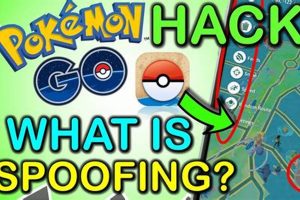Specific numerical values pinpoint locations within the popular augmented reality mobile game in Japan’s capital. These values, expressed as latitude and longitude, allow players to virtually navigate to designated spots within the game’s digital representation of the real-world city. For example, a set of numbers might direct a player to a specific park, landmark, or PokStop located within the sprawling metropolis.
The precise positioning data allows individuals to efficiently explore the game’s content, bypassing random exploration and directing them to potentially rewarding locations. This targeted approach optimizes gameplay, enabling quicker access to rare Pokmon, special events, and resources. Previously, players relied on word-of-mouth or general area descriptions, but the advent of exact location data streamlined the experience, fostering a more strategic and goal-oriented engagement.
Understanding the significance of geographic location opens avenues for exploring numerous facets of the mobile game. Subsequent sections will delve into resources for locating these figures, ethical considerations surrounding their use, and strategies for leveraging them to enhance the gaming experience.
This section outlines practical suggestions for utilizing specific location data to optimize engagement with the mobile game set in Japan’s capital. Adherence to these points can enhance the user experience and potentially yield more favorable outcomes within the game’s framework.
Tip 1: Verify Accuracy. Always cross-reference location data across multiple sources to minimize the risk of inaccurate coordinates. Inputting incorrect values may lead to wasted time and misdirection.
Tip 2: Prioritize Reputable Sources. Obtain location data from established communities, websites, or forums known for their accuracy and reliability. Avoid unverified or questionable sources that may disseminate false information.
Tip 3: Monitor Event-Specific Locations. Pay close attention to location data related to in-game events or promotions. These designated areas often feature increased spawn rates for rare Pokmon or offer unique rewards.
Tip 4: Leverage Community Resources. Engage with online communities to exchange verified location data and collaborate on identifying optimal hunting grounds. Shared knowledge can significantly enhance individual progress.
Tip 5: Exercise Caution Regarding Private Property. Refrain from using location data that directs individuals onto private property or restricted areas. Respecting boundaries is crucial for ethical and legal gameplay.
Tip 6: Be Aware of Dynamic Changes. Understand that location data can become outdated due to in-game updates or environmental changes. Regularly update data sources to maintain accuracy.
Tip 7: Plan Routes Strategically. Before embarking on a hunt, plan a route that incorporates multiple locations based on known coordinates. This maximizes efficiency and minimizes unnecessary travel.
By adhering to these guidelines, players can leverage specific location data to strategically navigate the digital landscape, optimize their gaming experience, and potentially achieve greater success within the game.
The following sections will address potential ethical considerations and offer concluding remarks regarding responsible and informed gameplay.
1. Precise geographical references
Precise geographical references are foundational to the effective utilization of location-based data within the augmented reality mobile game environment in Japan’s capital. The accuracy of these references directly impacts a player’s ability to interact with the game’s virtual elements superimposed onto the real-world cityscape. Without precise coordinates, locating specific points of interest becomes a matter of chance rather than a strategic endeavor.
- Accuracy and Game Mechanics
The game’s mechanics rely on the player’s physical location as determined by their device’s GPS. Deviations between actual location and the reported location, even minor ones, can lead to missed opportunities, such as failing to trigger an in-game event or being unable to interact with a PokStop. This necessitates highly accurate latitude and longitude data.
- Impact on Resource Acquisition
Specific coordinates often pinpoint the precise locations of resources, such as PokStops and Gyms. Errors in location data can render these resources inaccessible, hindering the player’s progress and limiting their ability to gather essential items. Accurate references are thus vital for efficient resource acquisition.
- Event Participation and Limited-Time Encounters
Many in-game events and special encounters are tied to specific geographic locations within the city. The accuracy of the reference data determines whether players can participate in these events or encounter rare or limited-time Pokmon. Inaccurate information results in missed opportunities and potential disappointment.
- Navigational Efficiency
Precise geographical references enable players to plan efficient routes through the game’s virtual landscape. This strategic planning is crucial for optimizing gameplay, allowing players to maximize their interactions with the game environment within a given timeframe. Inaccurate data leads to wasted time and detours.
In conclusion, precise geographical references are not merely desirable; they are essential for a successful and efficient gaming experience in the augmented reality environment in Japan’s capital. These references dictate a player’s ability to engage with the game’s core mechanics, acquire resources, participate in events, and navigate the digital landscape effectively. The integrity of location data directly correlates to the quality and enjoyment of the game.
2. Strategic resource acquisition
Within the augmented reality mobile game environment in Japan’s capital, strategic resource acquisition is directly contingent upon the availability and utilization of precise location data. The coordinates define the specific locations of in-game resources, such as PokStops, which provide essential items. Effective resource acquisition is not random; rather, it is a deliberate process guided by geographical awareness. For example, a player seeking specific items will employ location data to target areas with a high density of PokStops. The coordinates, therefore, are not merely points on a map, but rather enablers of goal-oriented gameplay.
Consider the practical scenario of a player preparing for a raid battle. Such an engagement necessitates a significant supply of potions and revives. Instead of aimlessly wandering the virtual landscape, the player consults location data resources to identify clusters of PokStops in areas such as Shinjuku Gyoen National Garden or Ueno Park. These areas, known for their concentration of resources, become the focus of the player’s strategic efforts. By efficiently gathering the required items, the player maximizes their chances of success in the raid battle. This process underscores the practical application of precise location coordinates in optimizing resource acquisition and achieving specific in-game objectives. Furthermore, coordinated efforts among players leveraging shared location data often result in more efficient resource gathering within specific areas.
In summary, the strategic acquisition of resources within the game is intrinsically linked to the availability and intelligent application of precise coordinates. The ability to efficiently locate and gather necessary items significantly influences a player’s progression and success in various aspects of the game. Challenges in resource acquisition often stem from inaccurate or outdated coordinate information, highlighting the importance of reliable data sources and community-driven verification. This strategic element remains a key facet of the overall game experience, underscoring the value of location-based awareness.
3. Event location targeting
Event location targeting within the context of the augmented reality game in Japan’s capital relies fundamentally on accurate and timely geographical data. The game developers frequently introduce limited-time events that occur within specific areas. Players wishing to participate must possess precise knowledge of the designated zones, typically expressed as latitude and longitude coordinates. These coordinates act as virtual keys, unlocking access to unique challenges, rare in-game creatures, and exclusive rewards obtainable only within those boundaries during the event’s duration. The success of event participation, therefore, is directly proportional to the precision and availability of these location parameters. An example is the annual Pikachu Outbreak event in Yokohama, where specific parks and landmarks feature enhanced Pikachu spawns accessible only through precise location data provided by the game or community resources. Without this targeting capability, players would be relegated to random exploration, significantly diminishing their chances of benefiting from the event.
The importance of event location targeting extends beyond individual player advantage. It fosters community engagement and coordinated gameplay. Online communities often pool their resources to identify and verify event coordinates, sharing this information widely. This collective effort allows players to strategically plan their movements, maximizing their efficiency and participation rates. Moreover, event-specific locations can stimulate local tourism, as players travel from distant areas to partake in the limited-time experiences. Tokyo’s Ueno Park, for instance, might experience increased foot traffic during an event that features rare Pokmon spawns within its confines. Understanding the precise locations, however, necessitates reliable data sources and an awareness of potential discrepancies due to GPS drift or in-game map updates.
In conclusion, event location targeting forms a critical component of the augmented reality game experience in Japan’s capital, serving as a gateway to exclusive content and fostering community interaction. The effectiveness of this targeting is intrinsically linked to the accuracy and dissemination of geographical coordinates. Challenges arise from data verification and the dynamic nature of in-game events, but the benefits of precise location knowledge are undeniable. This highlights the ongoing interplay between the digital and physical realms within the gaming landscape.
4. Community data sharing
Within the augmented reality mobile game environment situated in Japan’s capital, the sharing of location-specific information constitutes a critical component of player interaction and strategic gameplay.
- Coordinate Verification and Accuracy
Community platforms serve as primary hubs for validating location data. Players share coordinates, and through collective testing and feedback, establish the accuracy of these points. This is particularly vital given potential discrepancies stemming from GPS drift, server updates, or intentional misinformation. Verified coordinates ensure players are directed to intended in-game resources or events.
- Dynamic Spawn Point Tracking
The game’s mechanics introduce dynamic changes to in-game entity spawn points. These changes necessitate real-time updates to location information. Community-driven platforms provide a mechanism for rapidly identifying and disseminating new spawn locations, facilitating player adaptation and maximizing resource acquisition. This includes tracking rare spawns or event-specific appearances.
- Ethical Enforcement and Reporting
Community data sharing extends to identifying and reporting locations that violate the game’s terms of service or trespass on private property. Players collaboratively flag problematic coordinates, fostering a sense of shared responsibility for maintaining ethical gameplay and respecting real-world boundaries. This includes areas where gameplay could potentially disrupt public spaces.
- Specialized Resource Mapping
Community efforts often involve the creation of detailed maps highlighting specific resource concentrations or event hotspots. These maps aggregate player-sourced data, providing a comprehensive overview of optimal gameplay locations. Such mapping resources enable strategic planning and efficient resource allocation, optimizing the overall gaming experience.
The collective sharing of location-based information directly influences player engagement and strategic decision-making within the augmented reality environment of Japan’s capital. The accuracy, timeliness, and ethical implications of this information significantly impact the overall gaming experience, reinforcing the importance of robust community participation and data verification.
5. Ethical boundary respect
Ethical boundary respect represents a critical consideration in the context of location-based augmented reality games within densely populated urban environments. The availability and utilization of precise coordinates necessitate a corresponding awareness of real-world regulations, social norms, and individual property rights. The intersection of the virtual and physical realms demands responsible engagement to mitigate potential conflicts and ensure respectful coexistence.
- Private Property Intrusion
The use of geographical coordinates can inadvertently direct players onto private property. Adherence to legal boundaries and respect for private spaces are paramount. Examples include residential areas, businesses after hours, and gated communities. Players should actively verify that their in-game activities do not infringe upon the rights of property owners. This includes refraining from entering areas marked as private or restricted, even if the game’s map suggests accessibility.
- Restricted Area Access
Certain locations, such as government buildings, military installations, and construction sites, are subject to restricted access for security or safety reasons. Utilizing location data to access or approach these areas constitutes a violation of established regulations and poses potential risks. Players must exercise diligence in identifying and avoiding such zones, even if they appear as in-game points of interest. This is especially important near locations of national significance.
- Social Disruption and Public Nuisance
Concentrations of players drawn to specific coordinates can lead to social disruption and public nuisance. Large gatherings in residential areas, parks, or commercial spaces can generate noise complaints, obstruct pedestrian traffic, and create safety hazards. Players should be mindful of their impact on the surrounding environment and conduct themselves in a manner that minimizes disturbance to residents and businesses. This requires maintaining reasonable noise levels and refraining from blocking access to public amenities.
- Data Privacy Concerns
The sharing of location data, even within the gaming community, raises potential privacy concerns. Players should exercise caution in disclosing their whereabouts and avoid posting specific coordinates that could compromise their personal safety or security. Protecting personal information and respecting the privacy of others are essential considerations when engaging in location-based games. It is essential to consider the wider implications and potential risks of disseminating specific location information related to rare in-game objects.
The preceding points highlight the necessity of integrating ethical considerations into the usage of location coordinates within augmented reality games. Neglecting these principles can result in legal repercussions, social friction, and reputational damage. Responsible gameplay necessitates a commitment to respecting boundaries and engaging in a manner that minimizes disruption to the real world.
Frequently Asked Questions
This section addresses common inquiries regarding the use and understanding of location-specific data within the augmented reality mobile game environment of Japan’s capital. The following questions and answers aim to provide clarity and context for responsible engagement with the game.
Question 1: What constitutes “Tokyo Pokmon GO Coordinates?”
The term refers to precise latitude and longitude values that designate specific locations within the digital representation of the city in the mobile game. These coordinates enable players to navigate to designated points of interest, such as PokStops, Gyms, and event locations, more efficiently than random exploration.
Question 2: How are these coordinates typically formatted and used?
Coordinates are typically expressed as two numerical values: latitude (north-south position) and longitude (east-west position). These values are then inputted into mapping applications or in-game tools to identify the precise location on the game’s virtual map. Standard notation involves decimal degrees.
Question 3: Where can reliable sources of these coordinates be found?
Reputable online communities, dedicated websites, and established forums often curate and verify coordinate information. It is crucial to cross-reference data across multiple sources to mitigate the risk of encountering inaccurate or outdated values. Exercise caution with unverified or questionable sources.
Question 4: What ethical considerations apply to the use of precise location data?
Respect for private property, adherence to restricted area regulations, and mindfulness of social disruption are paramount. Avoid using coordinates that direct players onto private land, restricted zones, or areas where large gatherings could cause a nuisance. Responsible gameplay necessitates ethical conduct.
Question 5: How frequently do coordinates change or become outdated?
Coordinate accuracy is subject to change due to in-game updates, event alterations, and GPS drift. Regularly update data sources and verify coordinates before embarking on a hunting expedition. Dynamic changes necessitate continuous monitoring.
Question 6: What are the potential consequences of using inaccurate coordinates?
Inaccurate coordinates can lead to wasted time, misdirection, and missed opportunities. They may also result in unintended intrusions onto private property or restricted areas. Verification and cross-referencing are crucial for mitigating these risks.
In summary, a responsible and informed approach to utilizing location data within the game is essential. Accuracy, ethical awareness, and continuous verification are key elements for a successful and respectful gaming experience.
The subsequent section will delve into advanced strategies for leveraging location information to optimize gameplay and maximize resource acquisition within the specified geographic region.
tokyo pokemon go coordinates
This analysis has explored the multifaceted dimensions of “tokyo pokemon go coordinates” within the context of the augmented reality game. The investigation highlighted the significance of precision, ethical conduct, and community collaboration. Specifically, it addressed accurate geographical referencing, strategic resource acquisition, event location targeting, responsible data sharing, and crucial adherence to real-world boundaries. The detailed overview provided insights into optimizing gameplay and responsibly navigating the intersection of the virtual and physical spheres.
Given the ongoing evolution of both the game and its interaction with the urban landscape, a continuous commitment to informed and ethical gameplay remains paramount. A future emphasis on data verification, community stewardship, and mindful engagement will ensure a positive and sustainable experience for all participants. The dynamic interplay between the digital environment and real-world considerations necessitates sustained vigilance and a proactive approach to responsible gaming practices.







